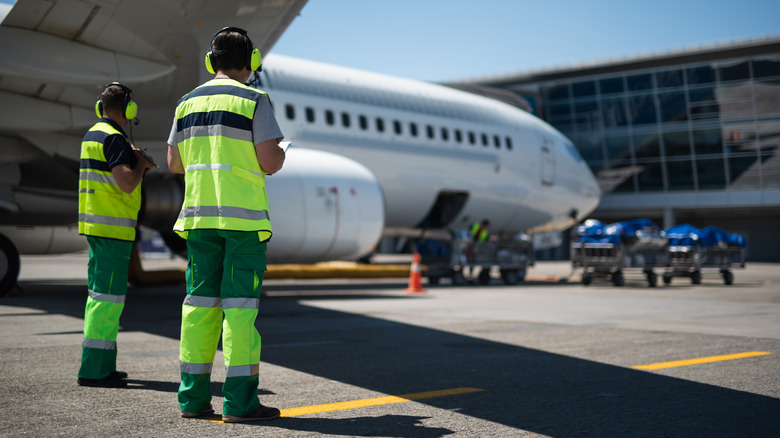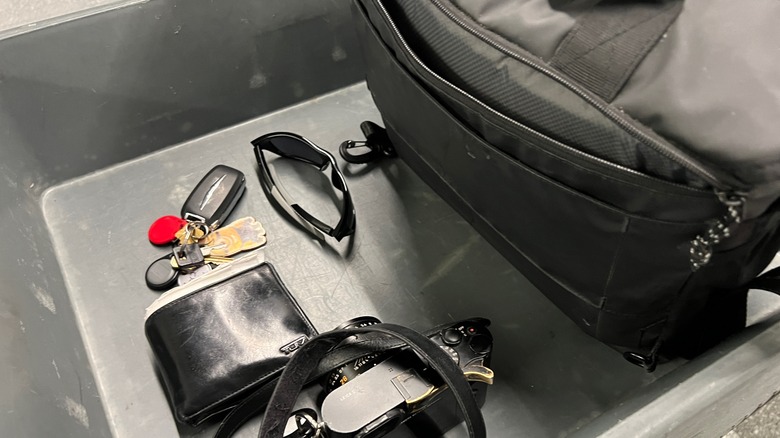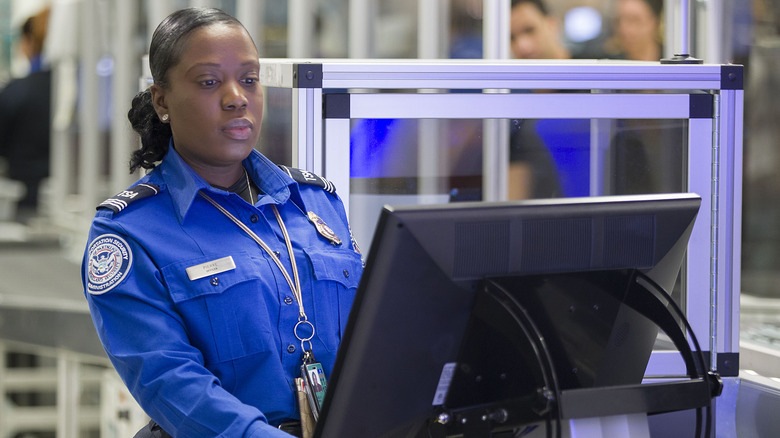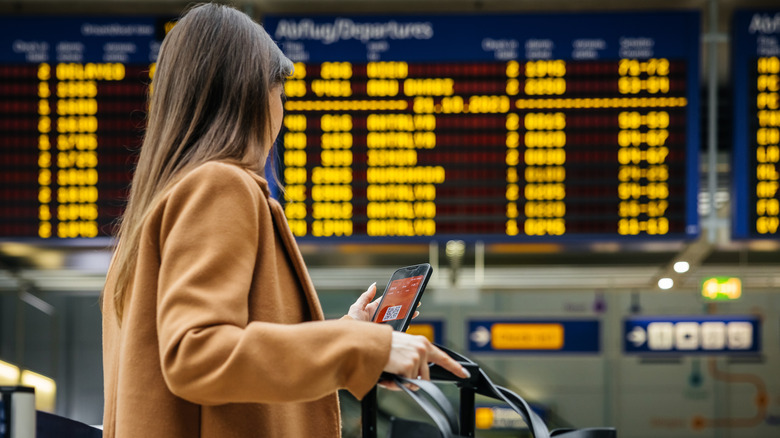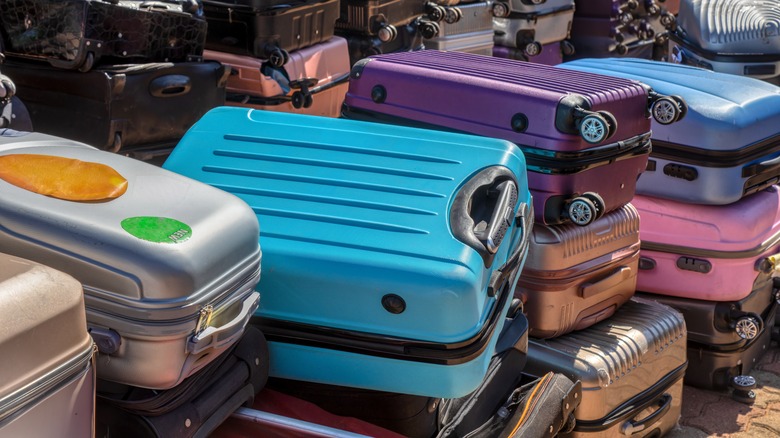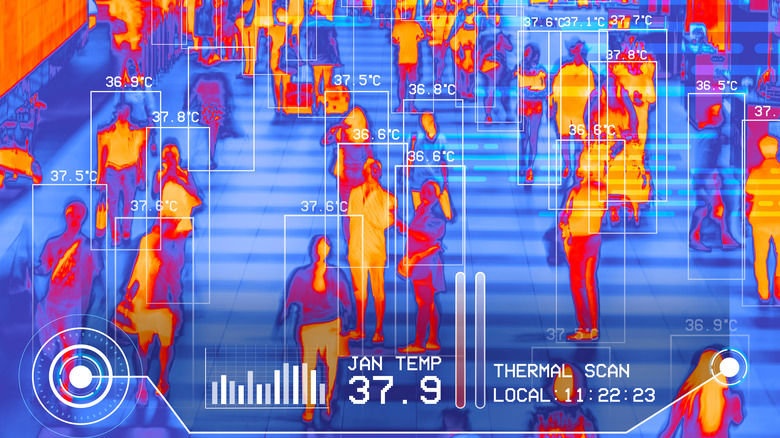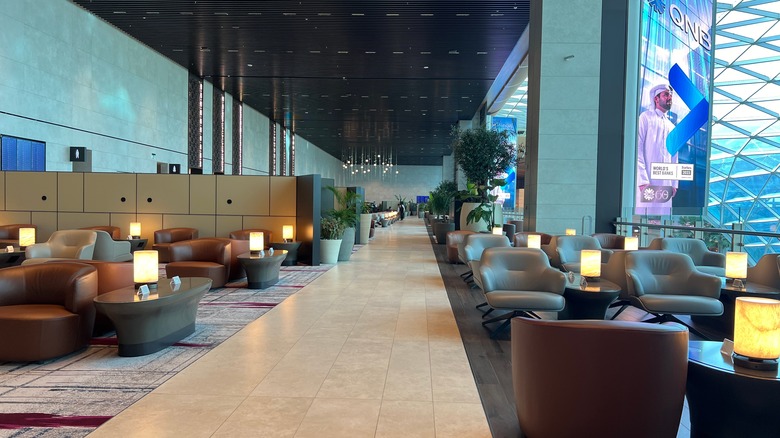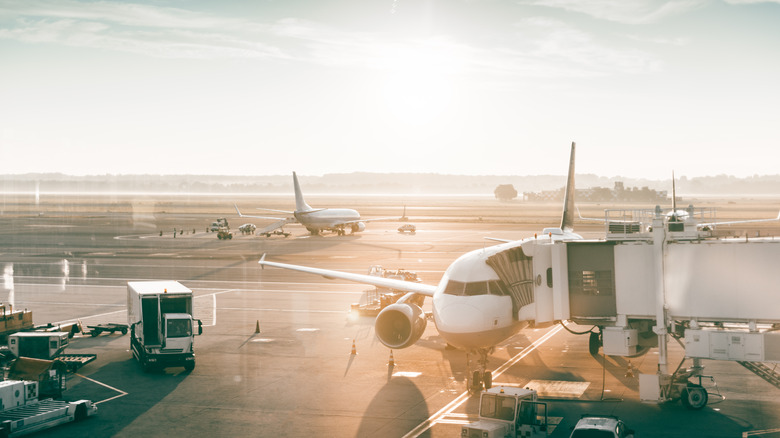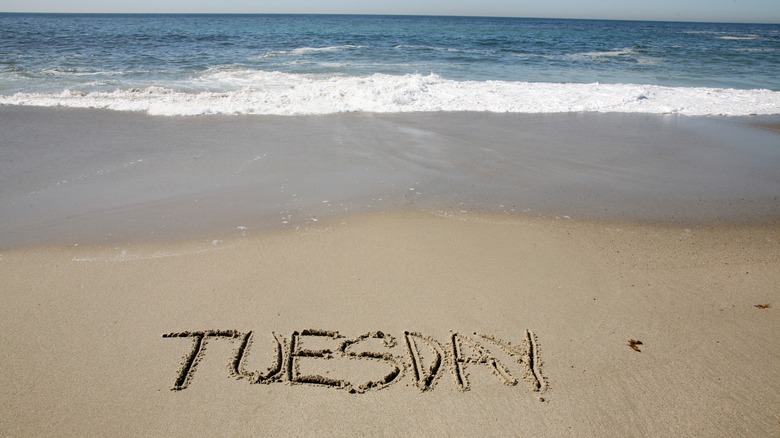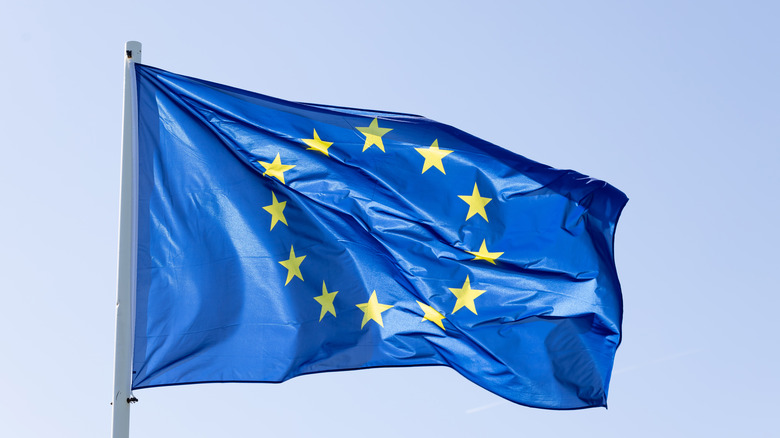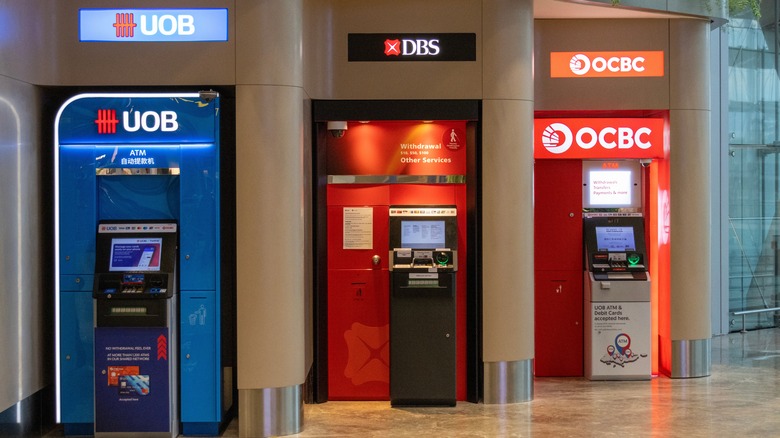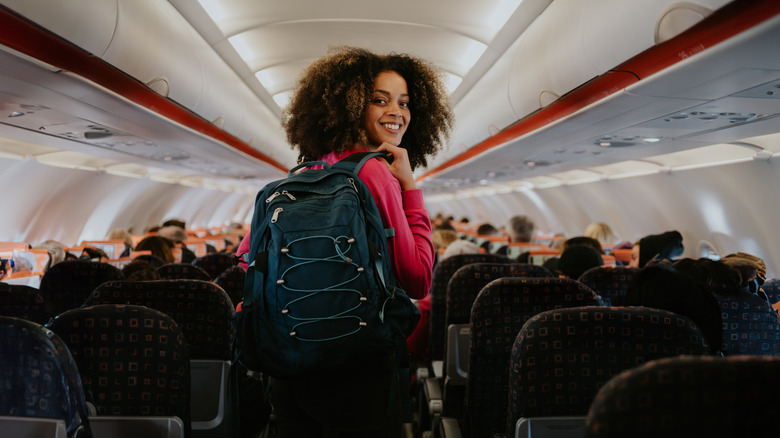Sneaky Things Airport Employees Don't Want You To Know
Being immense hubs of movement, airports can be truly bizarre places. From the staggering volume of cargo freight that moves through these terminals to the billions of passengers that occupy the world's departure halls on a yearly basis, airports perform a key function that keeps modern society ticking. However, airports aren't immune to breakdowns in communication, equipment malfunctions, wheeling and dealing, and all manner of tricky technological enhancements. These features either help or hinder the job of moving passengers and goods to their intended destination, and some are quite secretive.
Airlines, ground support staff, TSA agents, and everyone else you might encounter in an airport terminal are exposed to plenty of unique views of the air travel industry that travelers on the other side of the relationship generally never see. From oddities in the security screening process to practical matters involved in getting the best bargains for your money, these quirks of the air travel marketplace are often well-known among airport employees but less obvious for routine travelers.
The plastic security trays are dirtier than you think
It's often thought that toilets are some of the dirtiest places in any public space. After all, these areas are subjected to human bodily waste on a constant basis and can occasionally look like the set of a horror movie production. Cleaning staff aren't always able to tackle every bathroom need as quickly as it arises, leaving some facilities in a seriously unhygienic state. However, the bathroom isn't the dirtiest part of the airport in most instances. Instead, that dubious honor goes to those plastic trays you place all your belongings in while navigating the security line.
A 2018 study conducted by Finland's National Institute for Health and Welfare (alongside the University of Nottingham in the U.K.) found that germs are a persistent feature of the very air you breathe while traversing airport halls. That's not particularly surprising, given the ludicrous volume of people wandering through even the smallest airports. However, the most prolific germ magnet in the airport is generally the stack of plastic bins travelers use when moving through security. These trays are grabbed and handled by countless passengers and security staff every day. It only takes one sick person wiping their nose or coughing into their hands to spread pathogens to many others in the airport, potentially putting a huge dampener on your vacation in the process.
If your gender isn't obvious you may receive extra scrutiny
Even though the security tools that TSA agents have at their disposal are immensely powerful and technically advanced, they don't always include features that might seem intuitive. For instance, travelers are often directed through high-tech body scanners to screen them for hidden objects. The tool appears to be incredibly adept, but showcases a stunningly simple blind spot.
The TSA operator is instructed to assign a gendered scan pattern to each passenger's exam as they step into the now-commonplace footmarks and assume the illustrated position. Once a gender input is given to the machine, it scans the passenger with this anatomical layout in mind, with bulges expected in certain areas and a lack of body components in others. The scanner can't identify male versus female on its own, so if the TSA agent working the machine selects the wrong gender for any reason (perhaps a simple mental lapse and a flubbed button selection), the scan will come back highlighting a variety of areas that require additional attention. This creates a unique burden that affects certain travelers with greater regularity.
Arriving two hours early leaves you more time to shop
It's entirely possible to require a lengthy pre-flight routine. During particularly busy periods like travel around the holidays, weekends in March, and the Sunday after Thanksgiving (some of the worst times of the year to fly), extra time is generally warranted. However, if you're heading to the airport for a routine flight that shouldn't be swayed by large crowds or heightened historical flight cancellation rates, a two-hour headstart isn't necessary. For travelers taking only carry-on luggage and hopping on a routine flight, getting to the airport two hours early only creates an artificial need to spend money. It's this unique circumstance that airports are counting on when they advise arriving two or three hours ahead of your scheduled departure time.
Airports have increasingly begun to look more like shopping malls that happen to support transit gates. They aren't the spartan travel terminals that once served as simple yet effective waiting areas as people deplaned and new passengers took their place onboard the aircraft. The longer you spend in the secured area of an airport — unable to leave without potentially missing your flight — the hungrier you'll likely become. With shopping opportunities and food service options splashed across airports today, shifting passengers into the terminal halls early creates a unique opportunity to sell them things they don't inherently need.
Lost luggage and confiscated items are auctioned off
Every day, TSA agents confiscate all manner of bizarre items. These include plenty of firearms but also feature live animals, illegal substances, and lots of other things. Naturally, illicit goods aren't sold, but other confiscations that enter the possession of TSA have to be liquidated somehow — otherwise, the agency would end up managing an ever-increasing stockpile of strange stuff! Confiscated goods that are legal but can't be carried through an airport join the ranks of auction items sold by the federal government after taking possession through all manner of seizures. At GovDeals and other sites, as well as in-person auctions, these goods are sold off to bidders every day.
Confiscated items aren't the only thing sold by TSA. Luggage that has been lost and remains sitting in airports for 90 days also becomes fair game. Lost luggage is a common feature of air travel. Estimates suggest that seven pieces of luggage go missing for every 1,000 that get checked in, and many are eventually found and returned to their rightful owner. However, if you don't claim your luggage or it never turns up, the bag will sit in storage somewhere until it is auctioned off to make room for the next batch of unclaimed bags.
Thermal scanners help identify sick passengers
Thermal scanners are a common resource deployed by TSA agents. They help the security workers at airports identify potentially sick travelers, allowing them to intervene if someone's temperature is alarmingly high. Running a slight fever is common and can happen for a variety of reasons, but if your temperature spikes into triple digits (Mayo Clinic suggests definitely seeing your doctor at the 103 degrees Fahrenheit threshold), something else might be going on that requires your attention. Getting on an airplane when you're suffering from an illness like this is a bad idea for many reasons. For one thing, you can't get the treatment you likely need. You'll also be exposing countless other travelers to whatever is ailing you.
On another note, TSA agents often look for telltale signs of distress among passengers. This practice helps them identify smugglers and other passengers with illicit intentions. Sweating is one of those key indicators. It's also possible that thermal scans can alert TSA staff to possible smuggling efforts directly, like if you're hiding something cold against your warm body.
Your credit card might also give you lounge access
Airport lounges feel like an exclusive atmosphere off-limits to the average flyer. These areas may be quite luxurious or simply offer basic pleasures in a less crowded space. Airline-specific lounges are common, but others can be found in airports all over the world and open their doors to any passenger willing to pay for entry. Sometimes, lounge access is reasonable, while other entry fees can be exorbitant, making travelers think hard about the decision.
One feature of the travel experience that many people won't be familiar with is that credit card perks often include lounge access passes. If you carry a travel rewards card, there's a good chance you can either redeem free entry directly at the airport or pay for the pass and then enjoy a refund from your card issuer. Looking through your card's perks list or just wandering up to the welcome desk at an airport lounge to ask can potentially see you kicking back in style while you wait for your connection.
Arriving in the early morning comes at a price
Travelers searching for the perfect flight itinerary see a wall of arrival times, connection routes, and prices when they initiate a travel booking. Searching through flight options and seeing the vast number of choices available can make it seem like schedules are relatively static. This is especially true when your travel dates are flexible, and you scroll back and forth through days of the week looking for the best deal on what amounts to the same flight.
Arrival times that work best for your needs as a traveler are often the most expensive, leading directly to this comparison shopping operation. When venturing off on a long weekend getaway, arriving at 10 p.m. doesn't help much when another carrier (or even the same airline) could bring you to your destination first thing in the morning. Losing precious time hanging around at home is a severe annoyance, and airlines know this.
That's why those early morning flights are often priced at a premium. More importantly, the landing slots associated with those itineraries are also more expensive. It turns out that airline bigwigs frequently trade landing clearances, buying and selling time slots, making early arrival more costly for the airline. This one's a sort of back office secret among airport staff, but it might actually better serve the industry if it was more well-known. After all, there's perhaps a silver lining in knowing that you aren't just getting price gouged for the sake of it when choosing an early flight!
Tuesdays are often the cheapest day to fly
Speaking of looking for the most economical time to travel, it turns out there is a "best" day to fly when seeking bargains (on average). Tuesdays are statistically the least expensive travel days of the week — although this isn't a blanket rule that will always hold true for every single flight route. Business travelers tend to congregate at the airport early on a Monday and again later in the week — often in the afternoons and evenings on Thursdays and Fridays. Similarly, vacationers tend to travel near the end of the week and plan to return home on a Sunday evening to catch back up with the working week come Monday morning. Not all travel will fit these patterns, but enough rigidity exists in the contemporary schedules of travelers to create a basic template for demand. However, airport staff won't be too keen on letting this one slip. More people identifying these lower-demand days and shifting their schedule might create another high-intensity workday for airline staff, TSA agents, and other vendors in the terminal hall.
This phenomenon creates a gently curving price model that tracks with basic demand figures. Monday mornings are expensive times to travel, as are the afternoons at the end of the week (and particularly Sundays). This leaves Tuesday, perfectly positioned right in the middle of these heightened demand figures. If you can travel on a Tuesday — specifically early in the morning — you'll often be rewarded with some of the best weekly deals available. Airport staff might not like the sight of more Tuesday passengers, however.
Some travel comes with compensation guarantees
The European Union takes passenger rights seriously. Carriers based in EU countries and those flying to or from the EU must comply with a slate of regulations protecting passengers in case of delays, cancellations, or denied boarding. It's important to note that U.K.-based airlines traveling from Britain aren't subject to these rules any longer, even when flying to EU countries.
If your flight is delayed, you may be entitled to compensation of up to €600 per passenger (for long-haul flights that land more than four hours late). Short flights around Europe also feature this protection, with a compensation figure pegged at €250 when arriving more than three hours late. Airlines are also on the hook to provide a hotel for the night if you're stuck until the next day. They must also feed you (well, pay for your food), among other provisions. Naturally, airport staff won't give this information up without a fight. The more you know, the more demanding you're likely to become when waiting out a delay, adding extra work to their already taxing day.
In practice, the implementation of these rules can be hit or miss. Personally, I successfully claimed compensation from WOW Airlines in 2018 for a long delay from Reykjavik to Newark, but it took months for them to act, and the airline came up with a tricky Euro-to-dollar conversion method to minimize the payout. It is also important to note that if a delay is caused by something out of the airline's control (severe weather conditions, for example), compensation will not be forthcoming.
Airport ATMs are more cost-effective than the currency exchange
Many travelers flying internationally might (often rightly) want to carry some local currency with them. Paying for small ticket items in the destination with cash saves you from pulling out your credit card, smoothing over the budget a little and protecting you from potential skimming practices. However, many travelers make the mistake of buying foreign currency through avenues that tack on huge markups. Whether you head to the cash exchange desk at your arrival airport or ask your bank at home for a specialized withdrawal before leaving, you're opening yourself up to intense additional costs.
Often, the cheapest way to get local currency in virtually any destination is to use an ATM in the airport, much to the chagrin of exchange kiosk employees. Today, the vast majority of bank-branded ATMs offer free withdrawals. Even if you're subjected to an ATM fee, it will typically pale in comparison to the exchange markups you'll find elsewhere. Most egregious among offenders are those brightly lit up cash desks littered throughout the airport. They make a killing off of unsuspecting tourists. By withdrawing cash at an ATM instead, you're essentially charging your card for a purchase, and the conversion rate is built into the transaction on your bank's side of the event. This rate doesn't include any extra fees or markups and is often something like 1% to 2% off the interbank zero-rate cost. Just make sure you aren't using a card that charges a "foreign transaction fee" to get the best possible cost basis for your conversion.
Internet cookies can make flights more expensive
The math that powers flight search algorithms isn't just based on historical demand and estimated future passenger volume. No, the dynamic pricing that sometimes grants us great deals and other times dooms us to astronomical costs to fly anywhere is based on a hybrid model that also eats up real-time search data. It's often dreamy to casually peruse flight itineraries while contemplating your next jet-setting adventure, but all that searching can raise the price of the ticket you ultimately purchase. Unfortunately, flight staff aren't likely to divulge this information. They're busy working out the details of a flight's service, and the company brass is only happy to charge you more for the same flight!
Internet airline search aggregators — and the airlines themselves — use cookies to gather information on customers browsing flights. These feed information about real-time demand back to company decision-makers who set prices, often using an algorithmic "decision maker." The result is that more search equates to more perceived interest and demand, raising the cost of the good in the process.
Another key factor that plays into any airline search is the fare class. It's always best to search for a single ticket first, even if you're traveling in a group, to get around fare class adjustments. Tickets are grouped by price; when one fare class sells out, the price jumps up to the next figure. However, if there are two tickets left in fare class A and you search for three seats, you'll only see the price of three class B tickets — yet another way that knowledgeable ticket booking can save you some money.
Skiplagging isn't allowed, but airlines often have trouble catching practitioners
Skiplagging is a sneaky way air travelers have explored to get around pricey flight segments. As airlines have taken away inclusions and raised prices, travelers showcase reduced airline loyalty, opting for whoever can get them where they need to go at the lowest price. Other travelers have taken it upon themselves to strike back at the airline industry with some trickery of their own.
The practice involves buying a ticket to a destination you don't intend to travel to. Instead, you'll strategically select a stopover airport that is on your own itinerary and just leave the airport when you land at this intermediate point. This is particularly helpful when traveling to smaller airline markets that don't see as much demand and can save hundreds of dollars for a savvy traveler.
However (and it's a big however), airlines specifically prohibit this behavior in their terms of use, and it can create major headaches for airline staff operating the flight you've skipped. They'll continue to call your name until the last minute, potentially delaying the entire flight to try to accommodate a passenger who is in another destination entirely. If caught, you may ultimately be barred from flying with that airline for an extended period or made to pay the fare difference. Airlines don't have definitive methods to prove skiplagging, but they have caught travelers based on things like their home address on a driver's license.
